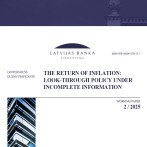Annual inflation slowly moves out of negative territory
According to the Central Statistical Bureau (CSB) data, the consumer price level in November had not changed year-on-year (inflation was 0.0%). The prices of energy resources may have influenced the improvement of several sentiment indicators but simultaneously they may be the reason for slightly reduced inflation expectations.
Oil prices in the global market dropped slightly in November, but the drop was largely compensated by the increase in the value of the US dollar; thus the month-on-month drop in the fuel prices shrank to 0.7%. Both on the supply and demand side, there are a number of speculations of what might happen with the oil prices in the coming months. From the point of view of inflation, however, it means that the lower the oil price level and the corresponding level of other energy resource prices, the greater are the percentage fluctuations of the prices of these energy resources by relatively small changes in the absolute sense.
According to the data of the Food and Agriculture Organization s (FAO), world food prices once again dropped in November after rising for just two months. That included dairy product prices because of disinterest of consumers, for the stocks of the largest importers are sufficient. The echoes of November world food prices have yet to reach Latvia, however: overall, food prices in Latvia rose, including groups in which that would not be expected because of supply factors, for instance, for cereal products.
The annual core inflation in November dropped very slightly: here the impact of costs was important where the influence of resource prices is low and the main positive contribution in the price dynamic might be on account of labour costs. In some groups of core inflation prices may reflect the rise in demand (for instance, for household equipment). In other sectors the competition for clients may be more pronounced – either consumption reaches a saturation point or the consumers' preferences may favour other groups of goods. That could be the reason for the prices to slow down a little, for instance, for financial services or books and stationery (in this group of goods one of the fastest and most stable price rises was observed this year).
According to the data of the European Commission, some consumer sentiment indicators improved slightly in November, including, for example, the evaluation of the family material situation as well as the overall assessment of the economic situation. Yet inflation expectations (reply balance indicator) contracted yet again. The dynamic of price expectations indicates that many among the surveyed population might have reacted, for instance, to the heating bills for October: even though this October, according to the CSB data of geographic statistics was cooler than last year and the consumption of heating energy went up, bills were substantially lower as a result of the drop in heating prices. The possibility of changing the electrical power supply contract for a slightly lower price than last year around this time might also have an effect on consumer sentiment. The abandoned discussion on the controversial imposing a VAT tax on cultural services, a slight drop in oil prices in the world market, which may be reflected in fuel prices (albeit perhaps invisibly if completely compensated by an increased excise tax) – these factors also represent a small potential for a further contraction of inflation expectations. This could eventually be compensated by a gradual inclusion of other indirect taxes into prices: the raising of the excise tax on alcoholic beverages in April and imposing the basic rate of VAT on the cost of housing management in July, which have been included in the 2016 budget.
In 2016, the annual inflation is likely to be higher than this year because moderate economic growth is expected to be maintained, there is expected a small rise in indirect taxes and a rather lesser possibility that the global resource prices, which have reached a rather low base could continue dropping at a rate similar to this year's.
Textual error
«… …»






